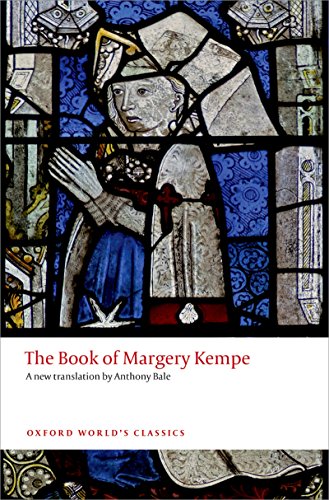This post is part of our Research Initiation Scheme for 2020-2021.

What does the autobiography of a medieval mystic and Twitter have in common? On the 23rd of April, Dr Alicia Spencer-Hall gave a fascinating presentation during which she suggested that Margery Kempe, a 15th century English Christian mystic and author of the first autobiography written in the English language, would be big on Twitter were she alive today.
However, it appears that being alive is not a criterion for having Twitter account, as Dr Spencer-Hall analysed 4 of the 15 Margery Kempe Twitter accounts which have sprung up to speak for the mystic in 2021. These Twitter accounts tell Margery’s story in different ways. Dr Spencer-Hall used her presentation to examine these accounts and how they are used to reinterpret and reclaim the life of a woman who lived nearly 600 years ago.
Providing some context about the mystic, Dr Spencer-Hall explained that Margery Kempe relied on a number of scribes to write her book. Because of this, the book, which presents Margery in an overwhelmingly positive light and uses the 3rd person to address her, has raised questions about its authenticity. Dr Spencer-Hall suggests there are similarities between Margery’s autobiography and Twitter today: both present highly edited and at times inauthentic reflections of self.
Dr Spencer-Hall began by examining how Margery Kempe, arguably a celebrity in the world of medieval studies, has been transformed into somewhat of a feminist icon today. This transformation, Dr Spencer-Hall suggests, is because Margery’s story, despite being written centuries ago, is relatable for the modern woman. She is, in the words of Dr Spencer-Hall, a mess. Perhaps most famous for her reputation for weeping during mystical experiences, (a reaction she claimed was completely involuntary and uncontrollable), Margery has become “an emblem […] of emotional labour”, as observed by medievalist scholar Rachel Moss. During the time she was alive and even today she is subject to male critique, often being positioned as an attention seeker after the release of the BBC 4 podcast ‘In Our Time’’s episode dedicated to her. Perhaps it is unsurprising then that she has gained the status she has amongst medieval feminist scholars, who find in her story parallels for their own enduring struggles against patriarchy.

Dr Spencer-Hall focused on how 4 different Margery Kempe Twitter accounts were used to regain power against the patriarchal forces that Margery herself was unable to fight. Whilst some accounts simply ventriloquized Margery’s story by tweeting direct extracts from her book, others took more interesting approaches to telling her story. Many accounts took chapters directly from the book and translated them into modern day sensibilities, using internet jargon, hashtags, asterisks and emojis to express and legitimise the intense emotions that Margery was famous for expressing. Rather than using the 3rd person in reference to Margery as is done in her book, these accounts give a voice to Margery herself by talking in the 1st person, and in so doing draw our attention to the limitations of the original text. These online Margerys, Dr Spencer-Hall explains, are committed to taking up space. They show that Margery Kempe was and is a woman worthy of our attention and in some ways provide a more legitimate account of Margery than the book itself.
It was interesting to see how medieval literature is used in a different context to express female experience centuries on. Dr Spencer-Hall encouraged me to think about how transhistorical research is conducted to create original and innovative work.
Report by Ida Willock-Creese, final-year undergraduate in Anthropology and Spanish